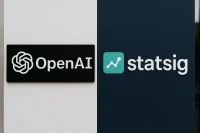Facebook owner Meta is taking a bold step into nuclear energy to meet the growing demands of its artificial intelligence (AI) systems.
The social media giant has plans to deploy small nuclear reactors by the early 2030s. This move highlights the company’s commitment to reliable, clean energy sources as it scales its data centers for advanced AI development.
Why Nuclear?
Meta’s AI ambitions require enormous computational power, which relies on millions of servers operating continuously in data centers worldwide.
To ensure a steady and sustainable power supply, Meta sees nuclear energy as a vital solution:
- Reliable Energy: Nuclear energy provides firm, baseload power, essential for 24/7 operations of data centers.
- Environmental Benefits: Compared to traditional fossil fuels, nuclear energy is a carbon-free power source, aligning with Meta’s sustainability goals.
- Scaling AI Needs: As Meta advances its AI technologies, its energy demands are expected to grow exponentially. Nuclear energy offers a scalable and long-term solution.
In a statement, Meta explained:
“Advancing the technologies that will build the future of human connection—including the next wave of AI innovation—requires electric grids to expand and embrace new sources of reliable, clean, and renewable energy.”
Need Career Advice? Get employment skills advice at all levels of your career
The Project
Meta plans to add 1-4 gigawatts of new nuclear generation capacity in the US by the early 2030s. For context, a typical US nuclear plant generates around 1 gigawatt.
The company is currently seeking proposals from nuclear power developers to design, finance, construct, and operate these reactors.
Looking for a job? Visit whatjobs.com today
Goals
- Accelerate Nuclear Technology: By partnering with developers, Meta aims to scale deployments and reduce costs.
- Support Broader Decarbonization: The initiative is not just about powering Meta’s operations but also advancing the nuclear industry as a whole.
Broader Tech Industry Shift
Meta’s nuclear ambitions follow similar moves by other tech giants:
- Google: Partnered with Kairos Power to build new nuclear reactors, with the first operational plant expected by 2030.
- Amazon: Signed agreements for innovative nuclear energy projects to power its operations and meet net-zero carbon goals by 2040.
Hiring? Post jobs for free with WhatJobs
Industry Perspective
Matt Garman, CEO of Amazon Web Services, emphasized nuclear energy’s role in combating climate change:
“Nuclear is a safe source of carbon-free energy that can help power our operations and meet the growing demands of our customers, while helping us progress toward our Climate Pledge commitment.”
What is Nuclear Energy?
Nuclear energy comes from the binding energy in the center of an atom. Through a process called fission, atoms are split into smaller atoms, releasing energy as heat and radiation. This heat is used to boil water into steam, which turns turbines to generate electricity.
Challenges and Considerations
- Capital Intensive: Nuclear projects require significant upfront investment compared to renewable sources like solar and wind.
- Strategic Engagement: Meta plans to engage with partners early in the development lifecycle to ensure successful deployment.
- Environmental Concerns: While nuclear is carbon-free, issues like waste management and site impacts require careful planning.
Looking Ahead
Meta’s nuclear initiative reflects a broader shift in the tech industry toward clean and reliable energy sources.
As AI continues to reshape industries, the energy infrastructure supporting it must evolve.
With nuclear power poised to play a critical role, Meta’s move could set a precedent for other companies navigating the intersection of technology and sustainability.




